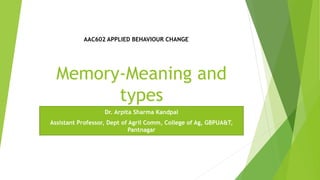
memory.pptx
- 1. Memory-Meaning and types Dr. Arpita Sharma Kandpal Assistant Professor, Dept of Agril Comm, College of Ag, GBPUA&T, Pantnagar AAC602 APPLIED BEHAVIOUR CHANGE
- 2. Memory Memory refers to the psychological processes of acquiring, storing, retaining, and later retrieving information. There are three major processes involved in memory: encoding, storage, and retrieval. Human memory involves the ability to both preserve and recover information. However, this is not a flawless process. Sometimes people forget or misremember things. Other times, information is not properly encoded in memory in the first place.
- 3. Concept of Memory In its simplest form, memory refers to the continued process of information retention over time. It is an integral part of human cognition, since it allows individuals to recall and draw upon past events to frame their understanding of and behavior within the present. In order to create a new memory, information must be changed into a usable form, which occurs through a process known as encoding. Once the information has been successfully encoded, it must be stored in memory for later use. Researchers have long believed that memories form due to changes in brain neurons (nerve cells). Our understanding today is that memories are created through the connections that exist between these neurons—either by strengthening these connections or through the growth of new connections.
- 4. Changes in the connections between nerve cells known as synapses are associated with the learning and retention of new information. Strengthening these connections helps commit information to memory. This is why reviewing and rehearsing information improves the ability to remember it. Practice strengthens the connections between the synapses that store that memory.
- 5. Short-term memories are a bit longer and last about 20 to 30 seconds. These memories mostly consist of the information people are currently focusing on and thinking about. Some memories are capable of enduring much longer—lasting days, weeks, months, or even decades. Most of these long-term memories lie outside of immediate awareness but can be drawn into consciousness when needed.
- 6. Painful Memories Research suggests that painful memories are remember because of increased biological arousal during the negative experience, which increases the longevity of that memory.
- 7. Sensory Memory Sensory memory is the earliest stage of memory. During this stage, sensory information from the environment is stored for a very brief period of time, generally for no longer than a half-second for visual information and three or four seconds for auditory information. People only pay attention to certain aspects of this sensory memory. Attending to sensory memory allows some of this information to pass into the next stage: short-term memory.
- 8. Short-Term Memory Short-term memory, also known as active memory, is the information we are currently aware of or thinking about. In Freudian psychology, this memory would be referred to as the conscious mind. Paying attention to sensory memories generates information in short-term memory. While many of our short-term memories are quickly forgotten, attending to this information allows it to continue to the next stage: long-term memory. Most of the information stored in active memory will be kept for approximately 20 to 30 seconds.
- 9. The term "short-term memory" is often used interchangeably with "working memory," which refers to the processes that are used to temporarily store, organize, and manipulate information. In a famous paper published in 1956, psychologist George Miller suggested that the capacity of short-term memory for storing a list of items was somewhere between five and nine.
- 10. Long-Term Memory Long-term memory refers to the continuing storage of information. In Freudian Psychologist, long-term memory would be called the preconscious and unconscious. This information is largely outside of our awareness but can be called into working memory to be used when needed. Some memories are fairly easy to recall, while others are much more difficult to access.
- 11. Recap One model suggests that there are three main types of memory: sensory memory, short-term memory, and long-term memory. Sensory memory is very brief, short-term memory is slightly longer, and long- term memory can last a lifetime.
- 12. Thanks